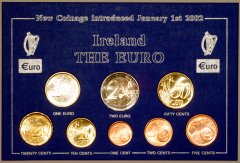| The Very Highest Quality Information... |
| Euro Coins |
|
| ||||||||||||||||||||||||||||||||||||

| ||||||||||||||||||||||||||||||||||||
History
The central theme behind the ideal of European Unity has often been the prevention of war between the European nations, and this ideal predates the 20th century. Following the devastation and loss of life as the result of two world wars in the first half of the 20th Century, this idea became much more attractive to those who had lived through these years.
European Coal and Steel Community
In 1952, the European Coal and Steel Community was formed. It was thought that the sharing of two resources vital to the munitions industry between European Nations, especially between old rivals France and Germany would make it 'materially impossible' for them to go to war with each other again. In 1957, the European Atomic Energy Community was formed, with similar motivations to those behind the ECSC. THE ECSC Initially consisted of France, West Germany, Italy, Belgium, Luxembourg and the Netherlands.
EEC
The European Economic Community was formed in 1958 by the Treaty of Rome the previous year. This replaced the ECSC and the EAEC. In 1960, Denmark, Ireland, Norway and the United Kingdom applied to join the three Communities. De Gaulle famously opposed Britain's entry on the grounds that Britain was a 'Trojan horse' for the US gaining influence over what he saw as a purely European institution. He therefore vetoed Britain's application.
However, in 1969 Georges Pompidou succeeded De Gaulle as president of France, and France's opposition to Britain's entry was dropped. After negotiations, Britain was accepted as a member of the EEC (known by most Britons as 'the Common Market') in 1972, along with Denmark and the Republic of Ireland. In 1976, the European Parliament became a popularly elected institution.
EU
In 1992, The Maastricht Treaty created the European Union, essentially an evolution of the EEC with increased competencies over areas of common foreign policies and provided for an Exchange Rate Mechanism (ERM) with a view to the creation of a single European currency. This currency entered into circulation in 2002, although some member states, such as Britain, Denmark and Sweden, declined to join the Euro. Which at the time of writing is undergoing a crisis due to the differences in the structure of the economies of each of the individual member states. As of 2012, the 27 member states of the EU are:
Austria, Bulgaria, Belgium, Cyprus, Czech Republic, Denmark, Estonia, Finland, France, Germany, Greece, Hungary, Ireland, Italy, Latvia, Lithuania, Luxembourg, Malta, the Netherlands, Poland, Portugal, Romania, Slovakia, Slovenia, Spain, Sweden, the United Kingdom.
Coinage of the EU
Prior to 2002, all individual nations used their own individual national currencies, such as the French Franc and German Mark. The Euro is divided into 100 cents. Copper-coated steel coins of 1, 2 and 5 cents are issued, alongside 10, 20 and 50 cent coins struck in a golden bronze alloy known as 'Nordic gold'. The 1 euro coin is bimetallic, with a nickel-brass outer ring surrounding a cupro-nickel inner segment. The 2 euro coin is a larger bimetallic coin with the inner and outer rings reversed compared to its 1 euro counterpart. All euro coins feature a common reverse (a depiction of Europe) whilst the obverse sides of each coin bear a different national design for each member state. Some states have only one single design on all their coins, others have a different design on each of the eight different coins, while some states have between two and five different designs.
24 EU members use this currency, whilst the remaining EU Countries, UK, Denmark and Sweden, use the Pound Sterling, Danish Krone and the Swedish Krone respectively.
| ...at the Lowest Possible Price |
|
32 - 36 Harrowside, Blackpool, Lancashire, FY4 1RJ, England.
Telephone (44) - (0) 1253 - 343081 ; Fax 408058; E-mail: info@chards.co.uk The URL for our main page is: https://24carat.co.uk |
Web Design by Snoop |